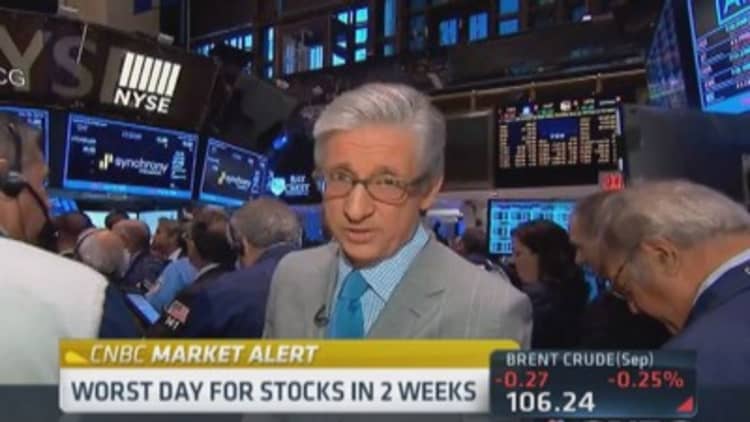
Stocks are sharply lower, with European stocks trading ugly right from the start. Germany is down more than one percent, and is lodged at the lowest levels in nearly three months.
Several factors are moving our markets, including:
1) The rhetoric in Ukraine is getting downright vitriolic. The Ukraine Prime Minister, Arseniy Yatsenyuk, said Russia was seeking to "revise the outcomes" of World War II by seizing the Crimean peninsula and fomenting war.
Read MoreWhite House: US, Europe to issue new sanctions on Russia this week
We are also seeing some global companies like BP talking about long-term impact from the Ukraine crisis.
2) Then there was Adidas, which lowered its full-year profit expectations, citing increasing risk stemming from Russia. The reduction was big: it now expects profit of $650 million, prior guidance was between $830 and $930 million, more than 20 percent lower. It wasn't just Russia: they also cited a generally "poor retail sentiment."
3) Portugal is also weak, down 3.5 percent. Late yesterday, Banco Espirito Santo, Portugal's largest bank, posted a $4.8 billion loss—the largest ever for a Portugese bank. Given that their capital cushion was only about $3 billion, they are going to have to raise capital. Lisbon's stocks benchmark is at its lowest level since October.
4) We saw the 10-year yields spike to over 2.6 percent when the Employment Cost Index came out higher than expected (up 0.7 percent)—the highest jump since 2008. The ECI details changes in the costs of labor for businesses, and it's more fodder for hawks on the Federal Reserve's rate-setting board to hike rates sooner.
5) Argentina's battle against default is highlighting emerging market risks (again).
Read More JPMorgan circles holdout Argentine bonds: Report
And, of course, we have the seasonal pundits. We are entering August, a seasonally weak period. August has been down four of the last five years.
Elsewhere
Six initial public offerings (IPOs) priced, the largest being Synchrony, the former arm of GE Capital. The company priced 125 million shares at $23, and are the largest private credit card issuer (think store-branded cards for retailers like Wal-Mart.
The good news: at $2.8 billion, Synchrony is the biggest IPO of 2014 thus far. Ally Financial earlier in the year was $2.4 billion.
The bad news: pricing was at the low end of the price talk of $23 to $26. Some have argued that Synchrony's assets are lower-quality than those of competitors like Capital One Financial, but loan growth is improving, and defaults are lower for all the card holders.
Read MoreCramer: 5 factions wreaking market havoc
Another IPO is Healthequity, a platform for managing health savings accounts, which priced 9.1 million shares at $14, well above the price talk of $10 to $12. Four other IPOs priced, which were:
a) Catalent, a global provider of oral, injectable and respirator drug delivery technologies. They priced 42.5 million shares at $20.50, in the middle of the $19 to $22 price talk;
b) Avalanche Biotechnologies priced six million shares—more than expected—at $17, at the high end of an upwardly revised range of $16 to $17;
c) Rare disease biotech Bio Blast Pharma priced 3.2 million shares—slightly less than expected—at $11, at the low end of the $11 to $13 range;
d) Gene therapy biotech Vascular Biogenics priced 5.4 million shares at $12, below the $13 to $15 price talk.
--By CNBC's Bob Pisani


